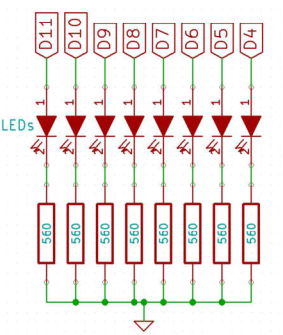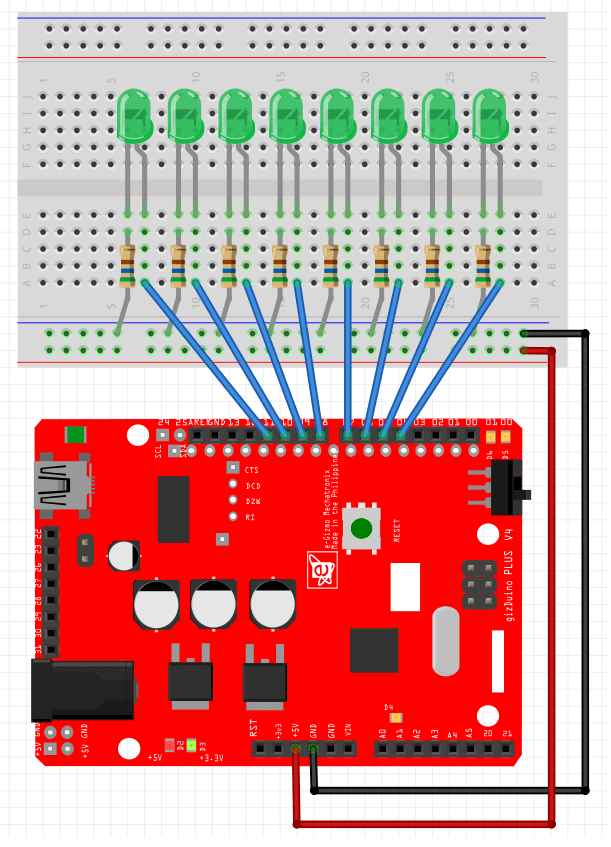gizDuino Blinking 8 LEDs
02 Apr


Posted By
Mercado Roma
0 Comment(s)
2664 View(s)
(Blinking LEDs,Running Lights, On/Off Sequence)
DEMO:Blinking
Runnning Lights
ON OFF Sequence
Materials Need:
1 x gizDuino PLUS ATmega644P Starter kit
1 x Solderless Breadboard
8 x Green LED 5mm
8 x 560 Ohms Resistor/p>
1 x USB Cable
9 x 1pin Jumper Wire (male-male)
Schematic Diagram:

Wiring Connection:
Digital pin 4 to 11 --> (+) Anode LED
(-)Cathode --> 560 ohms --> Ground

Codes:
| /* | |
| "GizDuino Starter kit" | |
| Blinking 8 LEDs | |
| STEP 1: Construct the circuit of GizDuino Blinking 8 LEDs. | |
| STEP 2: Connect the USB Cable to your computer. | |
| STEP 3: Open the Arduino IDE. | |
| STEP 4: Open the BLINKING 8 LEDS Sample code from GizDuino Starter kit code. | |
| STEP 5: Then, click Upload. | |
| This sample code turns ON the LEDs in 1 second and turn OFF | |
| in 1 second. It is a simple and easiest way using more pins | |
| for blinking LEDs. | |
| */ | |
| // givenname for digital pins. | |
| int a = 4; | |
| int b = 5; | |
| int c = 6; | |
| int d = 7; | |
| int e = 8; | |
| int f = 9; | |
| int g = 10; | |
| int h = 11; | |
| // the setting up of pins. | |
| void setup(){ | |
| // initialize the digital pins as an output. | |
| pinMode(a, OUTPUT); | |
| pinMode(b, OUTPUT); | |
| pinMode(c, OUTPUT); | |
| pinMode(d, OUTPUT); | |
| pinMode(e, OUTPUT); | |
| pinMode(f, OUTPUT); | |
| pinMode(g, OUTPUT); | |
| pinMode(h, OUTPUT); | |
| } | |
| // the loop is where your program runs repeatedly. | |
| void loop(){ | |
| digitalWrite(a, HIGH); // turn the LEDs ON (HIGH) | |
| digitalWrite(b, HIGH); | |
| digitalWrite(c, HIGH); | |
| digitalWrite(d, HIGH); | |
| digitalWrite(e, HIGH); | |
| digitalWrite(f, HIGH); | |
| digitalWrite(g, HIGH); | |
| digitalWrite(h, HIGH); | |
| delay(1000); // wait for a second | |
| digitalWrite(a, LOW); // turn the LEDs OFF (LOW) | |
| digitalWrite(b, LOW); | |
| digitalWrite(c, LOW); | |
| digitalWrite(d, LOW); | |
| digitalWrite(e, LOW); | |
| digitalWrite(f, LOW); | |
| digitalWrite(g, LOW); | |
| digitalWrite(h, LOW); | |
| delay(1000); // wait for a second | |
| } |
| //////////////////////////////////////////////// | |
| // // | |
| // RUNING LIGHT // | |
| // // | |
| // This serves as a sample program for // | |
| // an LED monitor showing a running light // | |
| // // | |
| // // | |
| // Codes by: // | |
| // eGizmo Mechatronix Central // | |
| // Taft, Manila, Philippines // | |
| // http://www.egizmo.net // | |
| // April 11, 2013 // | |
| //////////////////////////////////////////////// | |
| int DEL1 = 100; // Adjust this delay for separating functions | |
| int DEL2 = 100; // Adjust this delay for individual delay of turning on/off the LEDs | |
| int LED_NUMBER[] = {4,5,6,7,8,9,10,11}; | |
| void setup() | |
| { | |
| for(int i =0; i<=7; i++) | |
| { | |
| pinMode(LED_NUMBER[i],OUTPUT); // Sets all the LED pins as OUTPUT | |
| } | |
| } | |
| void loop() | |
| { | |
| ASCENDON(); | |
| delay(DEL1); | |
| ASCENDOFF(); | |
| delay(DEL1); | |
| DESCENDON(); | |
| delay(DEL1); | |
| DESCENDOFF(); | |
| delay(DEL1); | |
| } | |
| // Turns on the LEDs in ascending order | |
| void ASCENDON() | |
| { | |
| for(int i=0; i<=7; i++) | |
| { | |
| digitalWrite(LED_NUMBER[i],HIGH); // Turns on the LEDs | |
| delay(DEL2); | |
| } | |
| } | |
| // Turns off the LEDs in ascending order | |
| void ASCENDOFF() | |
| { | |
| for(int i=0; i<=7; i++) | |
| { | |
| digitalWrite(LED_NUMBER[i],LOW); // Turns off the LEDs | |
| delay(DEL2); | |
| } | |
| } | |
| // Turns on the LEDs in descending order | |
| void DESCENDON() | |
| { | |
| for(int i=7; i>=0; i--) | |
| { | |
| digitalWrite(LED_NUMBER[i],HIGH); // Turns on the LEDs | |
| delay(DEL2); | |
| } | |
| } | |
| // Turns off the LEDs in descending order | |
| void DESCENDOFF() | |
| { | |
| for(int i=7; i>=0; i--) | |
| { | |
| digitalWrite(LED_NUMBER[i],LOW); // Turns off the LEDs | |
| delay(DEL2); | |
| } | |
| } |
| //////////////////////////////////////////////// | |
| // // | |
| // ON OFF SEQUENCE // | |
| // // | |
| // This serves as a sample program for // | |
| // an LED monitor showing a on off sequence. // | |
| // // | |
| // // | |
| // Codes by: // | |
| // eGizmo Mechatronix Central // | |
| // Taft, Manila, Philippines // | |
| // http://www.egizmo.net // | |
| // April 11, 2013 // | |
| //////////////////////////////////////////////// | |
| int DEL1 = 100; // Adjust this delay for separating functions | |
| int DEL2 = 100; // Adjust this delay for individual delay of turning on/off the LEDs | |
| int LED_NUMBER[] = {4,5,6,7,8,9,10,11}; | |
| void setup() | |
| { | |
| for(int i =0; i<=7; i++) | |
| { | |
| pinMode(LED_NUMBER[i],OUTPUT); // Sets all the LED pins as OUTPUT | |
| } | |
| } | |
| void loop() | |
| { | |
| ASCENDONOFF(); | |
| delay(DEL1); | |
| DESCENDONOFF(); | |
| delay(DEL1); | |
| } | |
| // Turns on and off the LEDs in ascending order | |
| void ASCENDONOFF() | |
| { | |
| for(int i=0; i<=7; i++) | |
| { | |
| digitalWrite(LED_NUMBER[i],HIGH); // Turns on the LEDs | |
| delay(DEL2); | |
| digitalWrite(LED_NUMBER[i],LOW); // Turns off the LEDs | |
| delay(DEL2); | |
| } | |
| } | |
| // Turns on and off the LEDs in descending order | |
| void DESCENDONOFF() | |
| { | |
| for(int i=7; i>=0; i--) | |
| { | |
| digitalWrite(LED_NUMBER[i],HIGH); // Turns on the LEDs | |
| delay(DEL2); | |
| digitalWrite(LED_NUMBER[i],LOW); // Turns off the LEDs | |
| delay(DEL2); | |
| } | |
| } |



















Leave a Comment